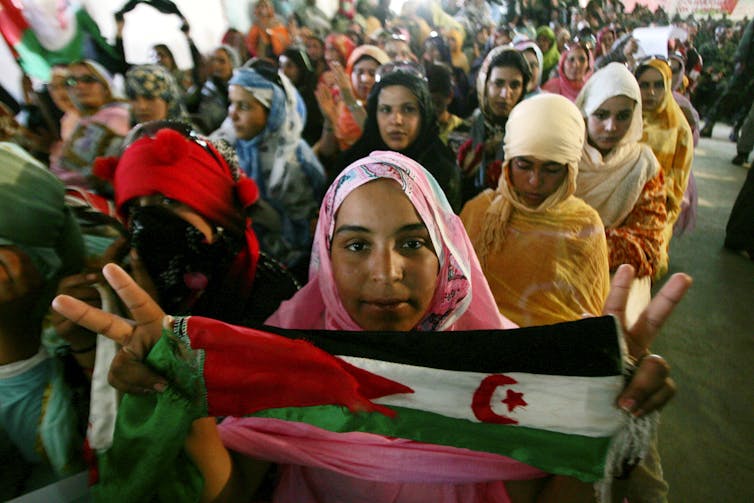
Frank Mattheis, University of Pretoria
South Africa and Namibia hosted a “solidarity conference with Western Sahara”, convened by the Southern African Development Community (SADC) on 25 and 26 March 2019 in Pretoria. The summit opened with a call for unity in “ensuring the right to freedom and self-determination of the people of the Western Sahara”. Politics and society editor Thabo Leshilo asked Frank Mattheis for some perspective.
What is the issue? Why does Western Sahara require a solidarity conference?
The Western Sahara is a disputed territory in Northwest Africa. It is sparsely populated and consists mainly of desert. Two parties claim sovereignty of the territory. One is the Moroccan government, which considers it a province with certain autonomous rights. The other is the Polisario Front, a political and military organisation that has proclaimed the area as the Sahrawi Arab Democratic Republic.
A referendum to choose between the two options was proposed as far back as 1991. But it’s never happened. This is mainly because of disputes over who would be eligible to vote. Negotiations between Morocco’s government and the Polisaro Front have resulted in little progress since. The two parties officially ceased their military operations in 1991, but the situation remains fragile despite a United Nations peacekeeping mission being deployed to the Western Sahara since that same year.
The solidarity conference hosted by SADC can be seen as a reaction to the gradual shift of power towards Morocco. In 2017, Morocco joined the African Union (AU) after a 33-year absence. It chose to stay away because the Sahrawi Arab Democratic Republic was already an AU member (it remains so today).
Since Morocco joined, the AU has held back from playing a further role in the conflict. Previously its Peace and Security Council had tried to intervene on the issue. This shows that most African countries prefer to circumvent the thorny issue of self-determination for Western Sahara; instead, these countries are pursuing closer ties with Morocco.
The SADC region, however, is home to countries like Zimbabwe and South Africa. They are among the Polisario Front’s most faithful allies. They have sided with the Sahrawi Arab Democratic Republic because of how Morocco has handled the Western Sahara’s status, which reminds them of their own legacy of settler colonialism.
How long has the problem been brewing?
Since the late 19th century, when the territory was colonised by Spain. When Spain withdrew in 1975 a war broke out between Morocco, Mauritania and the Polisario Front over control of the Western Sahara.
Mauritania retreated after four years. But fights between Morocco and the Polisario Front (which was supported by Algeria) continued all the way until 1991. Back then, the United Nations established the Mission for the Referendum in Western Sahara to oversee a truce. No solution has been implemented since. The current UN Personal Envoy for Western Sahara, former German president Horst Köhler, has struggled to make notable progress.
The longer the conflict continues, the more the power balance tilts in Morocco’s favour. Economically and diplomatically the Kingdom of Morocco has been on the rise on the continent. This offers tangible gains to its allies and makes it ever more powerful.
Meanwhile, the Western Sahara’s inhabitants are suffering. Human rights violations are reportedly common. Protest movements that support self-determination are restricted and oppressed.
The level of reported violence has diminished in recent years. That’s why the issue of Western Sahara has gradually disappeared from the international agenda.
What’s the significance of a declaration from SADC?
The declaration issued at the end of the conference confirms SADC’s long-standing support for the Polisario Front.
While other African countries have abandoned this position in favour of closer ties with the economically strong Morocco, SADC (and other countries such as Algeria) still follow a value-driven foreign policy in this regard. The declaration confirms that the AU remains split on the matter.
However, the impact of the declaration is limited to maintaining the issue on the agenda. It is unlikely to have a direct impact on the intended referendum, and the UN remains the main body that can resolve the impasse.
It’s also worth noting that Morocco hosted a parallel conference on the Western Sahara to undermine SADC’s efforts. This just highlights the divisions.
What would success look like?
Success from a SADC and Sahrawi Arab Democratic Republic point of view would entail the self-determination of the Sahrawi people. But, it would still count as a notable success if the SADC declaration marks a reversal of the current trend that favours Morocco’s diplomacy in Africa.
On a global level, success for the Sahrawi Arab Democratic Republic people could also mean forging stronger alliances with other countries, such as the European Union, for their self-declared republic.![]()
Frank Mattheis, Senior Researcher in Global Studies, University of Pretoria
This article is republished from The Conversation under a Creative Commons license. Read the original article.

